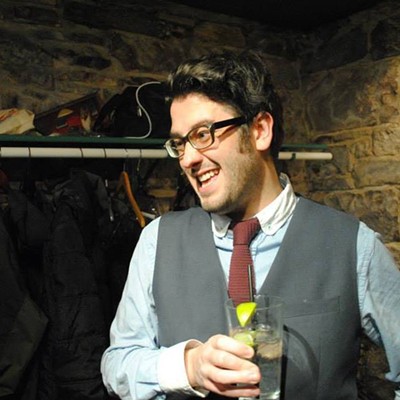See also: The Ten Best Comedy Events in Denver in October
Westword: You've been to Denver a few times over the years. You have a pretty long relationship with Comedy Works, right?Bob Saget: Yeah, I love it. I guess it was like fifteen years ago that I started playing there. But yeah, I love the people; everybody that works there. I love Wende. I love the audiences a lot in Denver -- I'm sure everybody tells you that -- but there's a couple of clubs that I want to go to when I'm trying to find myself, and Comedy Works is one of the few places that exists in the U.S. that I can, one of the few where I want to go, where I look forward to it. And I always feel like I've left there with something. And so then I take antibiotics.
Are you working out new material in these shows? A new hour, maybe?
No, I'm working out some new stuff, but not a whole new hour because I'm not capable of doing that right now. I've been too busy with other stuff, I'm in the middle of the casting process right now. There's definitely new stuff I'm working on. Then there's stuff I'm processing differently. Also, because I also do some music, the audience kind of wants to sing along with those.
I imagine songs enjoy a longer shelf-life, particularly for sing-along purposes.
Music does have a long shelf-life. That's why people really do need to clean their shelves. I love comedy music. It's something I've done since I was eleven. It's also something that a lot of other people do, but I think that mine is mine. It's fun to do them. My standup has been even more riffy than usual as of late, so it will feel different even for the people who come back to see me. I think writing the book, which took me a year and a half, has changed even how I talk when I perform.
I noticed that your writing style is very riffy. For instance, in the introduction there's a random paragraph about fucking a goat?
Yeah, and it doesn't stop after that. The intro also lets you know that people are gonna die in this book. And that my testicles have an issue -- one of them is jealous about the other one. It's a little bit of theater of the absurd, and a little narcissism -- which all of us comedians have. Then it's also a way to deal with pain, and I'm very open about that -- because I didn't spend all this money on therapy for nothing.
Was there any editorial resistance to your digressive writing style?
Just the opposite. My editor at Harper Collins just got what I do. He'd seen all the things I'd done. He told me that I had a way to do this, that I had a facility for it. I'd never written a book before. I'd had a book come out 25 years ago -- a picture book I did with a guy named Tony Hendra called Tales From the Crib. We had people send in pictures of their kids and Tony and I would write a caption. It was funny, but that's not a book. Dirty Daddy's an actual book. You know you're doing well -- and I just made the New York Times list, which they told me is a big deal, so, okay, it's a big deal -- because they don't send free books anymore. My other book, I think I have all the copies. When they actually sell, they don't give them all to you. It comes out in paperback next month.
Why'd you call the book Dirty Daddy? Was it a way of branching out into the fetish community?
Oh, that's so funny. When we hash-tagged it, we found out that there is a porn movie by that name. I hope people don't think it's just lascivious. My daughters read it, and they also agreed it was a great title because of the way people perceive me. Because I am a father and because I don't have a filter when it comes to what I find funny. When you're a dad and you tell jokes that are inappropriate, people think that the jokes are worse than they actually are. It was just taking the branding image that exists and thinking what would fare well with the way people perceive me. And it's alliteration. It's a good title.
It does sum up the dichotomy of your public image.
Yeah, and I cop to it. I'm very honest, and I'm well-aware of my public image. I mean, it's in the book. Whether it be the Half Baked line, or Entourage, or The Aristocrats, or even the Tourettes guy, I'm pretty aware of the funny perceptions people have of me. I think the diversity of roles shows that I didn't just go nuts after Full House. I was playing a part. I think finding out what my sense of humor was like all along shows that I actually can act. That would be scary, though, if a guy actually was like Danny Tanner...
...And then just had a psychic break?
I would consider isolation for a guy who just went from A to B like that. The family guy who lost it. Keep reading for more from Bob Saget.
How come you decided to include crowd work in your special?
Well, I was in that mode and I was thinking, "Well, this is kind of who I am and kind of what I do." I'm good at this, why should I try to do a carbon copy of other specials? That's part of what I do. There wasn't a huge amount of crowd work, and it was television crowd work. It was no different than talk-show crowd work, except this is live and it's all standup. I love working people into the show. I always have. That's how I started out in clubs. But once I was on Rodney Dangerfield's Young Comedians special, and no one wants to see you do crowd work on that. In the special, it's incorporated into the material. I love shows that feel like a town meeting.
Did you have to take a sabbatical from standup while you busy being on TV every day in the '90s?
Yeah, I had many sabbaticals that I took. I'm actually taking one at the end of October. I don't have any dates booked. I'm doing other work, but I also do it so I can get into -- I'm good at honing the same hour, but you kind of want to do it as a reprise for people. When I did two shows at the same time -- thirty years ago or whenever the hell that was, it was eighty hours a week between Full House and America's Funniest Home Videos -- I did some standup. Especially, and this is in the book, when I lost two sisters. One of them was dying while I was doing Full House. So I'd go to Cedar Sinai Hospital at night to see her after shooting all day to hang with her, and then I'd go to the Comedy Store to do a set. Just to kind of howl at the moon a bit. Then I'd go home and write the video show the next day. So I was just a bit of a banshee, and really sad through a couple years of that process.
I actually did do an HBO special while both of those shows were in the top ten. I don't want to see that special out a lot. Some of it was good. There were a couple good pieces in it, but for the most part I'm glad it's not out there. There's very little of my old standup that I want out there. I don't take all my old performances and bottle them. I think of it like I was still just gestating. A work in progress.
Now, I mean, the coolest thing happened last year. I got nominated for a Grammy for That's What I'm Talking About, which was really cool. It really is nice to get recognized by people who see and hear everything in order to make the choice. It's a bit like in high school, running for class president and not winning, but it's still cool. It's a Grammy, which I've always looked up to. That's not what I do this for... back to your question. Sorry, I feel bad for you right now. After the video show ended, I directed. I didn't want to be on camera anymore. I had directed this thing called For Hope, which was about my sister. It was based on her dying from scleroderma.
You do a lot of benefits for them, right?
Yeah, I'm on the board trying to help people. Then I did Dirty Work with Norm MacDonald, which took about a year. But I stopped touring and I stopped even going up at clubs pretty much. So I just concentrated on directing. Then the directing thing didn't continue to come at me, so I wasn't going to go through a Kickstarter mentality, which didn't exist then. I was always trying to get an independent feature made and it never happened.
Then I did standup again, and I kind of found my voice and that morphed out into the That Aint Right special. That was kind of my biggest, nine-year-old boy stomping his feet way of saying, "I'm not that guy you think I am." So that's what that was. I thought it had some very funny things in it, and I'm proud of whatever that was. I started to learn what my style was, which is just one long public service announcement. Telling people not to have sex with things.
Certainly not goats.
Yeah, you can't. Animals, all kind of things.
Only consenting human beings.
Not even them anymore. I don't think we should do anything. Just celibacy and airbrushing. We should all look like Marilyn Manson when he had no genitalia on that album cover. Just ambiguous. That's what we should be like.
Bob Sagat willl be at Comedy Works South on Friday, October 17 and Saturday, October 18. The early show begins at 7:15 p.m., followed by a 9:45 p.m. show both nights. Tickets cost $38 on the Comedy Works website.
Follow Byron Graham on twitter @ByronFG for more mildly amusing sequences of words.











